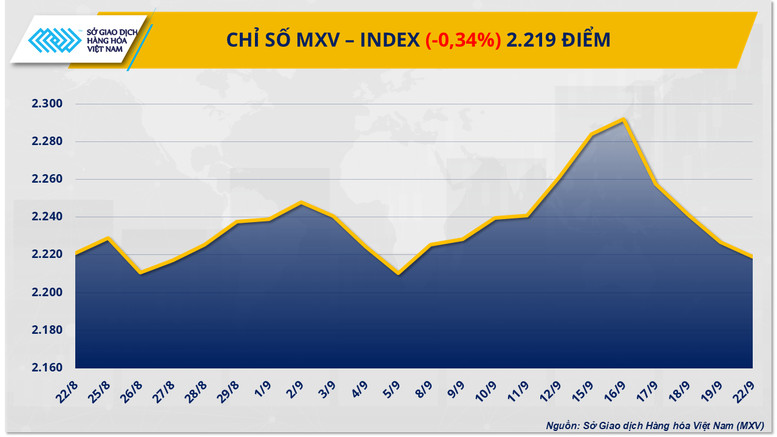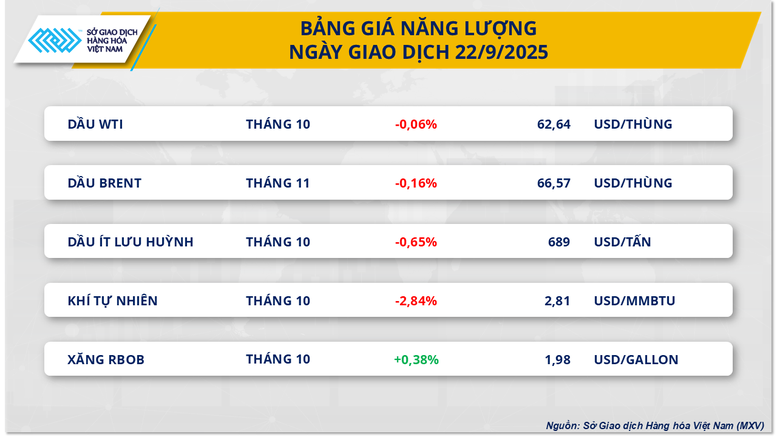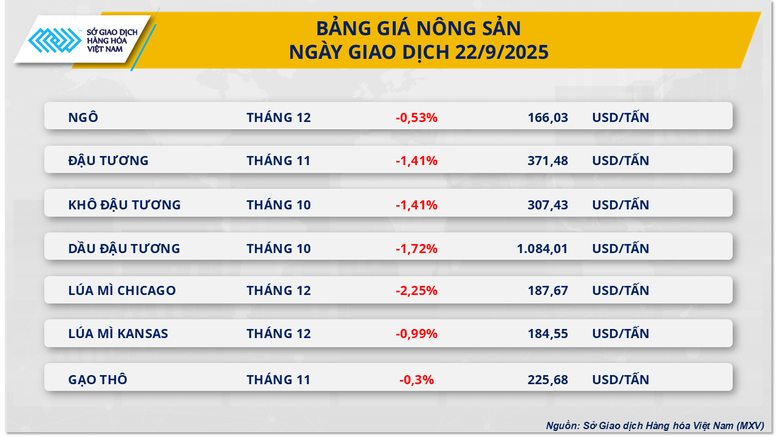
Supply and demand pressure governs energy prices
According to MXV, the energy market yesterday witnessed overwhelming selling pressure with 4/5 commodities simultaneously decreasing in price. Of which, Brent oil price fell to 66.57 USD/barrel, corresponding to a decrease of about 0.16%; while WTI oil price decreased by about 0.06%, stopping at 62.64 USD/barrel, marking the 4th consecutive session of weakness.

News of plans to increase supplies from the Middle East and concerns about falling US energy demand outweighed the impact of geopolitical tensions, putting pressure on oil prices in yesterday's trading session.
According to Ali Nizar Al-Shatari, Director General of the Iraqi State Oil Marketing Company (SOMO), Iraq's oil exports in September are expected to reach 3.4-3.45 million barrels per day, a slight increase from 3.38 million barrels per day in August. In addition, Kuwait - another OPEC member - has increased its maximum oil production capacity to 3.2 million barrels per day, the highest level in more than a decade. The country is expected to maintain production at 2.559 million barrels per day.
Meanwhile, the risk of declining energy demand in the US remains present in the context of investors' concerns about the health of the world's largest economy . Three leaders of the US Federal Reserve (Fed) have spoken out that there is not much room for monetary easing policies in the near future.
Alberto Musalem, president of the St. Louis Fed and a member of the Federal Open Market Committee (FOMC), said that while he supported the Fed's 0.25% interest rate cut in September to stimulate the labor market, subsequent monetary policy should refocus on controlling inflation that is still higher than the 2% level set by the Fed.
Earlier on September 17, the Fed cut interest rates to 4-4.25%. Although this was theoretically a move to support oil prices, investors focused on the reasons for the Fed's decision and the message in the interview with Chairman Jerome Powell. Recession fears and inflationary pressures have reduced confidence in the outlook for energy demand in the US, putting oil prices under strong pressure.
On the other hand, geopolitical tensions surrounding the Russia-Ukraine conflict and the risk of supply disruption from Russia remain factors holding back the decline in oil prices.
Agricultural products prices fell across the board
At the end of yesterday’s trading session, all 7 agricultural products decreased in price, reflecting the cautious sentiment that covered the market. Of which, corn was the product under the greatest pressure when the price decreased by another 0.5% to 166 USD/ton.
According to MXV, oversupply pressure remains the main factor driving corn prices. The latest report from the USDA shows that US corn production in the 2025/26 crop year has been raised to a record 427 million tons, up 1.83 million tons from last month thanks to expanded harvested area. Although average yields in some states have been revised down, the 11.3 tons/ha level is still enough to bring the forecast ending stocks to 53.6 million tons - a seven-year high. Crop quality is also positive, with 67% of corn acreage rated good to excellent, the highest since 2018. These factors reinforce expectations of abundant supplies in the coming period.

On the other hand, demand is not strong enough to balance the market. Market sentiment is also contributing to the pressure. As of September 16, hedge funds still held more than 80,000 net short contracts on corn, reflecting that the pessimistic view has not changed significantly. Commercial investors even increased their net short position to more than 108,000 contracts, adding to the technical pressure, making it difficult for prices to recover.
In addition, rising domestic transportation costs due to low water levels in the Mississippi River have pushed freight rates up to $25-30 per ton, up from $15-20 previously, reducing the competitiveness of US corn in the international market. At the same time, Brazil has planted 25% of its first corn crop, while Argentina has temporarily abolished its grain export tax to boost sales. These moves signal that global supplies will continue to be abundant, increasing direct competitive pressure with US corn in the coming time.
Source: https://baochinhphu.vn/thi-truong-hang-hoa-mxv-index-noi-dai-chuoi-4-phien-giam-102250923104801435.htm












































































































Comment (0)